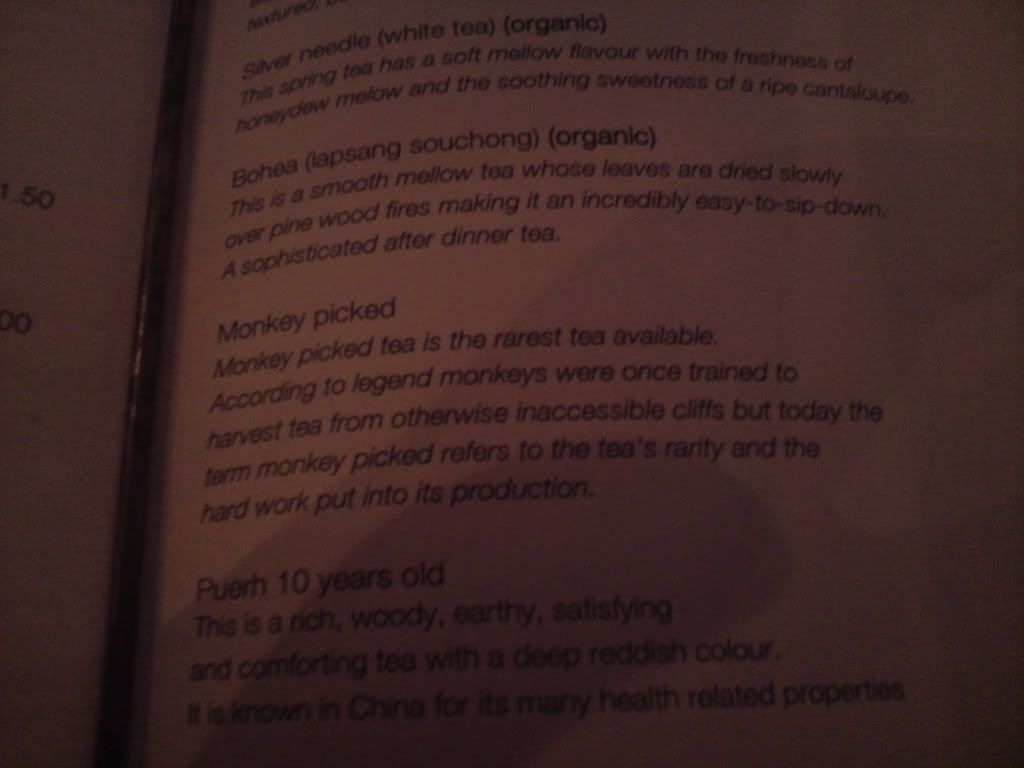I went to a swanky restaurant in London the other day and after a great cocktail, some very good Argentinean red wine and English rose (yes, I kid you not, it was very nice), an excellent thick rare 700 gram steak, sat back and thought about having a good port and a nice cheese platter, when my eyes fell on this item on the dessert menu.

Monkey Picked Tea: Monkey picked tea is the rarest tea available. According to legend, monkeys were once trained to harvest tea from otherwise inaccessible cliffs but today the term monkey picked refers to the tea's rarity and the hard work put into its production.
It was for £5.50 if I am not wrong, and being the sucker for new and innovative things that I am, I went for it. First of all, my boss took the piss out of me unmercifully by saying, you have simply ordered PG tips, and the restaurant is taking you for a ride. Mainly because of the Monkey bit which advertises the bloody PG Tips. You can buy all kinds of PG Tips monkey stuff here. But more on the end result later.
But took a photo and then came back to look it up. The basic story is simple and I quote:
This rare Chinese tea is carefully picked by specially trained monkeys in a remote mountain region of China. Legend has it that monkeys were first used to collect tea ten centuries ago, because upon seeing it's master trying to reach some tea growing wild on a mountain face, the monkey climbed up the steep face and collected the tea growing there and brought it down to his master. This wild tea was considered so delicious that other people began to train monkeys to collect this rare wild tea. Nowadays the practice of monkeys picking tea has all but died out, except in one small remote village where they still continue this remarkable tradition.
This video seems to be showing a monkey which the zoo commentator claims to be a tea picking monkey. All I can hope is that I hope the bloody monkey washed his hands after picking its nose but before picking the tea leaves.
Here's an example of the pack. And here's an interesting discussion on this tea.

But I was a bit suspicious because nobody actually mentions the type of tea leaves, all this monkey picking business is good and fine, but what is the actual name of the tea plant? And then found it. Can you purchase this? Well, here it is. I quote the product description:
These finest grade tightly hand-rolled leaves are bursting with flavor and have a lingering fruity aftertaste. This is perhaps the most fabled tea in China, prized for its complexity. This lot was grown in Fujian Province. Legends relate the story of how the tea is named after Kuanyin, the goddess (or bodhisattva) of compassion. This tea is greener than other Tieguanyins, in the style which is popular throughout China.
The often-used term "Monkey Picked" comes from another legend: Local monks convinced monkeys to climb the tall, wild tea trees and bring them the new leaves from above. This tea is one of the few that holds up well to up to three infusions, and produces a rich golden liquor with a spicy aroma and semisweet aftertaste. We recommend this tea as a high quality everyday tea. It goes well with most foods and is good with cakes, scones and the like.
But I am afraid the tea was absolutely horrible, it was musty, dusty and tasted like the tea was made by actually dipping the original old monkey in hot water rather than tea leaves. It was golden all right, but no, I am going to give this a miss.
And this left my boss and rest of the gang rolling around on the floor looking at my face and expression. Still suffering from that incident, every time I ask for a tea or coffee in the office, somebody shouts PG Tips or makes those monkey noises. Sighs, life sucks.
No comments:
Post a Comment